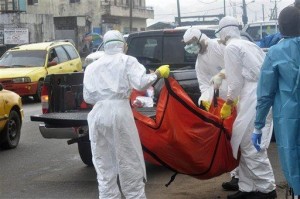
Health workers in protective gear carry the body of a person suspected to have died from Ebola on the street of Monrovia, Liberia. AP FILE PHOTO
The World Health Organization (WHO) on Thursday reiterated the protocol on the use of personal protective equipment (PPE) for health workers dealing with patients suspected to have Ebola, saying that they are required when in close contact with a person displaying symptoms of the virus and should only be worn by trained people.
The WHO reiterated the guidelines amid a debate whether or not acting Health Secretary Janette Garin and Armed Forces Chief of Staff Gen. Gregorio Pio Catapang should have worn protective gear when they made a now controversial visit to the 132 Filipino peacekeepers under quarantine on Caballo Island last Sunday.
“When caring for an ill patient with Ebola, the PPE should form part of the range of measures to prevent transmission, including appropriate facilities for barrier nursing and work organization, water and sanitation, hand hygiene and waste management,” the WHO said.
Close contact
PPEs include face cover, head cover, protective footwear, gowns and coveralls.
It also noted that donning PPE was essential when in close contact with a patient showing symptoms of Ebola. “The PPE should only be worn by those people who have been trained in the correct way to use it,” it said.
Lapses in the PPEs protocol have resulted in the infection of many health care workers in West Africa and the United States.
The WHO also stressed on Thursday that PPEs were in limited supply across the world and should only be used “where strictly necessary, i.e., by trained personnel” for reasons it has outlined.
“The WHO does not recommend general bans on travel or trade or general quarantine of travelers arriving from an Ebola-affected country,” it stated.
But the WHO said it was recommending the exit screening of travelers leaving Ebola-stricken countries through international airports, seaports and major land crossings.
“The WHO would remind anyone returning from an Ebola-affected country to inform the quarantine medical officer on duty at the port of entry and monitor their health for 21 days,” it said.
Noting the high incidence of malaria in West Africa, any person returning from these countries who develops a fever should be treated immediately for malaria “even without a diagnostic test,” it added.
RELATED STORIES
Palace: Facilities readied for Filipinos returning from Ebola-hit countries
Palace to make sure Ebola does not spread in PH
There’ll be no stopping Ebola spread in PH, says expert